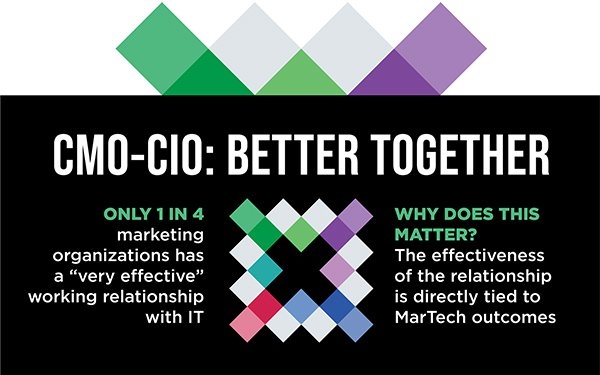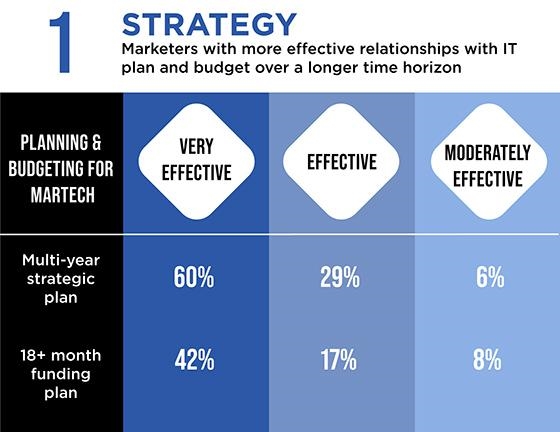CMO-CIO Relationship Needs Tightening To Improve Performance: CMO Council Report

The future of performance in advertising depends directly on the relationship that CMOs have with their tech-counterparties, CIO, but only 23% of companies that took part in a study released today say they have a “very effective” CMO-CIO working relationships.
Making MarTech Pay Off, the Chief Marketing Officer (CMO) Council report published in collaboration with KPMG LLP, delves into aspects of the marketing-IT relationship, how they are structured and governed, what types of marketing technology capabilities and outcomes they effectuate, and how marketers can take this relationship to the next level.

The report is based on a survey conducted in spring 2021 of more than 200 marketing leaders across 12 industries such as financial services, retail, healthcare, telecom, consumer products, technology and manufacturing. Additionally, the CMO Council conducted in-depth interviews with executives at PayPal, Comcast, GE Healthcare, Salesforce (Tableau), Fidelity Investments, Autodesk, eBay, and others.
The findings suggest that only one in four marketing organizations has a “very effective” CMO-CIO working relationship. It is significant because the effectiveness of the relationship is directly tied to performance.
The report shows that “very effective” CMO-CIO relationships produce the best outcome. The relationship enables CMOs to keep up with the pace of innovation.
Planning strategically, integrating strategic considerations into tactical decision-making, solidifying strategic considerations through holistic participation in selection and management stages, and measuring performance broadly and regularly are all outcomes of the relationship.
For example, 65% of CMOs in “very effective” relationships with CIOs use marketing innovation as an operations metric. Some 58% say they pilot new technologies, and 71% engage in activities designed to provide insight into innovation.
Key findings from the study include:
- 60% of CMOs in “very effective” relationships with IT have a multi-year strategic plan for marketing technology, compared with 29% of CMOs in “effective” relationships
- CMOs in “very effective” relationships with IT use an average of two innovation techniques, compared with 1.2 for CMOs in “effective” relationships
- 65% of CMOs in “very effective” relationships with IT regularly collect and distribute marketing technology KPIs with insights and recommendations, compared with 36% of CMOs in “effective” relationships
- 48% of CMOs in “very effective” relationships with IT have an equal partnership, compared with 21% of CMOs in “effective” relationships
The best CMO-CIO relationships lead when it comes to innovation, data-driven metrics, governance, and alignment and integration. These are often the traits needed to compete, yield greater returns on investment, and provide a more satisfactory experience for employees and customers.
Interestingly, a trademark of CMOs in “very effective” relationships with CIOs can also be seen in the range of different types of metrics used to measure and manage MarTech.
Those who say they have “very effective” relationships report on MarTech performance across significantly more KPIs in each category. Of “very effective” relationships tracking customer metrics, more than 80% report using customer experience, omni-channel engagement and customer satisfaction to measure marketing technology performance.
When measuring the financial value, more than 60% of “very effective” relationships use revenue, return on investment, and customer lifetime value as KPIs.
(34)
Report Post









